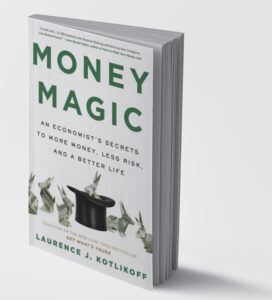Laurence J. Kotlikoff is not one to mince words: In his new book, “Money Magic,’’ Kotlikoff offers no-frills strategies for and opinions on achieving financial well being, often at the expense of hoary theories and stuffy academicians. The book is scheduled for release January 4.
 Despite what people might have heard, Kotlikoff, a professor of economics at Boston University, says they will not lose Social Security benefits permanently from working; they should plan to live until 100; that it’s wise to buy more, not less, stocks if they are retired; that reverse mortgages are not a cost-effective way to free trapped home equity, and that it makes a “huge’’ difference if they retire at 67 rather than at 62.
Despite what people might have heard, Kotlikoff, a professor of economics at Boston University, says they will not lose Social Security benefits permanently from working; they should plan to live until 100; that it’s wise to buy more, not less, stocks if they are retired; that reverse mortgages are not a cost-effective way to free trapped home equity, and that it makes a “huge’’ difference if they retire at 67 rather than at 62.
He figured out years ago that even brainiac economists can’t accurately predict how much money a person can spend annually through life. So, he designed computer programs that he says can correctly do that. He uses them for his software company. He says MaxiFi Planner helps him find his clients more money.
“But rest assured, this book is not a long-winded software sales pitch. The book is self-contained. I’m going to tell you what economics generally prescribes as well as what MaxiFi specifically prescribes,’’ Kotlikoff says.
Five Ways to Revive the Dream
First example: The Smiths retire and realize they have saved far too little to realize their dream of a carefree, even luxurious retirement. Kotlikoff says there are five simple ways the Smiths can revive their dream: wait to take their Social Security benefits until they reach 70; start withdrawing from their 401(K)s immediately, and take their withdrawals in the form of joint survivor annuities.
“Next, they should downsize their four-bedroom house by half, and finally, they should move to New Hampshire, which has no state income tax.’’
His plan adds up to an increase of $1,578,374 available to the Smiths during their lifetime, he says. Kotlikoff takes his own advice: Against the protestations of his siblings, he recommended they buy their 88-year-old mother an annuity to support her growing needs. She lived until 98.
Work Longer
He reminds readers that those who take Social Security benefits early have permanently reduced their benefits, and so, have affected their spending and saving, future assets, future taxable income and future federal and state income taxes. Advisors need to be emphatic with clients about how to use Social Security to best advantage.
Kotlikoff maintains that he is not trying to freak out readers, but, he is clear that Americans are not adept savers and that they probably will live longer than they assume. So, it’s a really, really good idea to work as long as possible — i.e., don’t retire early unless you have an ironclad plan guaranteeing your financial security.
“Let me pound the metaphorical table: No matter how many times your financial planner or the Social Security system references life expectancy, you can’t count on dying on time.’’
He advises readers to set their planning horizon at maximum age. Example: A woman plans to live to 100, and also plans to see her living standard drop by 1% from age 75 on. She saved 20 cents out of every dollar earned, which Kotlikoff says will “perfectly smooth her living standard right through age 100.’’
He provides plenty of figures showing that delaying retirement provides more savings; the woman who lived until 100, realized $280,000 in extra lifetime benefits by waiting.
Kotlikoff’s chapter, “Social Security Ten Secrets to Maximizing Your Lifetime Benefits,’’ warns readers that they are responsible for filing for any earned benefits among the 13 that are available; Social Security does not notify you when you become eligible. For those who took their retirement benefit too early, he says, they can suspend the benefit until full retirement age or any age prior to 70. Those born before Jan. 1, 1954, who are eligible can file for a free spousal benefit, and, properly sequencing widow benefits will maximize life benefits for survivors.
His “bottom line’’ on reverse mortgages? “(They) do let you use trapped equity to repay the amount borrowed, but they do so at a very high price and significant risk.’’ There are chapters on marrying for money —really — and on divorce; here’s a nugget from the latter:
“The longer you’re married, the longer you’ll pay or receive alimony unless you’re close to retirement age, in which case the opposite becomes true.’’
Nice Words on Advisors
Although Kotlikoff says he has gripes about common investment advice and the financial planning industry, he has these nice things to say about advisors:
“Even a hefty annual investment fee may be well worth paying if your advisor truly has specialized investing acumen or is keeping you from making major blunders. Also, your advisor may be encouraging you to save more, finding ways to lower your taxes, guiding to you to higher Social Security benefits, and performing other money magic.
“If you think you’re overpaying, ask for a lower fee or try to buy the advisor’s advice by the hour. Better yet, insist your advisor do economics-based planning for you.’’
Eleanor O’Sullivan is an award-winning journalist. “Money Magic,’’ by Laurence J. Kotlikoff. Little, Brown Spark. 307 pages. $29; $14.99 Ebook.







